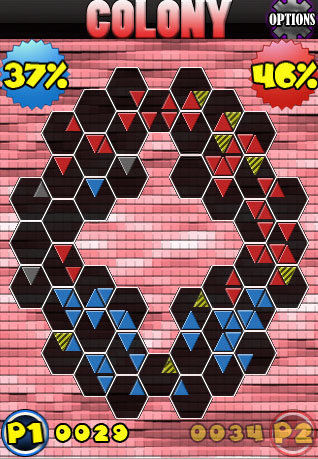
Colony can be a very addictive and enjoyable game; but not always.
Man, I wish I could end this review with that one sentence. But Pocket Gamer is a harsh mistress, and I owe you a lot more words before I can retire to my cage with a tin of cold baked beans. So let me expand on that opening statement, but do keep referring back to it when things get so confusing you want to punch out my teeth and play a chipped-tooth-arranging-puzzle-game on the pavement.
Coming up with a new handheld puzzle game must be phenomenally difficult, considering the massive catalogue of similar titles that've been pouring out ever since Tetris first fell into place. Therefore, the mind-melting complexity of fathoming how to make a game like Colony is a serious testament to developer Chris Haynes' coding skills.
That's not to say Colony is especially complex to play. You can really get your teeth into the meat of a dedicated puzzle animal here, but predicting the effects each move will have is likely to be beyond the scope of human understanding. For some, that point will hold massive appeal, as the constant cross and change of power between the two opponents will add an infinite depth of challenge. For others, the incalculable permutations won't be much more than an aggravation that reduces Colony to a five-minute exercise in iPhone fondling.
Let me attempt to explain the mechanics of this puzzle game, and perhaps things will become clearer. Though probably not.
The board is made up of a collection of hexagons in many different formations. Each hexagon can hold six triangles, which are placed in empty spaces to denote that as being 'your hexagon'. Taking turns with the opponent (another player or the iPhone) the objective is to dominate a significant portion of the game board. That's nice and simple, and it's just as well considering the baffling mechanics that are at play as the game heats up.
Once a hexagon has the same number of triangles inside it as there are other hexagons touching it, those triangles 'explode out' into the surrounding hexagons. You can see that already the simple task of placing coloured triangles inside empty hexagons has become quite perplexing. Let's say the hexagon in question is on the edge of the board, so there are three other hexagons (the other spaces making up the game board) touching it. Once you've put three triangles inside that first hexagon, each triangle jumps out into those three adjacent hexagons – one in each. This is how your triangles spread across the board to dominate it.
Should the opponent have any triangles in one of the touching hexagons, they become yours. This aspect is just about fathomable when looking at the board, and you can reasonably calculate the most strategic places to put your triangles to fill as many empty hexagons as possible. But what happens next serves to throw you right back into the brain twisting bin. Should the opponent have several triangles already inside a hexagon when you take it over, that can cause the hexagon to meet the required number of triangles to cause it to explode into the surrounding hexagons, and a cascade effect takes place.
A single move can then change the colour of the entire board, and any hope of playing a strategic game is completely shot – which is a damn shame, since Colony is a game not at all dissimilar to draughts, so players need to feel as though a game can be won through careful planning rather than an accidental cascade of coloured shapes. Indeed, the game even has a built in fail safe to stop an infinite loop of tumbling triangles from melting your iPhone.
Despite the game's incalculable complexity of operation, it can still be very entertaining as a lost game is suddenly recovered from the brink by a well placed triangle – if only it was possible to predict, and deliberately place, that winning piece.
Ultimately, it's down to your expectations of what a good puzzle game should offer. If you like to calculate your victory, Colony will sell you short, but if random chance is your thing, there's a lot of fun to be had. It's probably best summarised by saying Colony can be a very addictive and enjoyable game; but not always.
Colony

